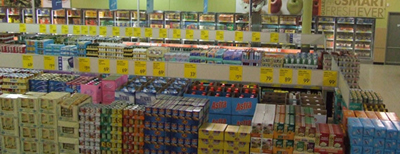"It’s a meatloaf and mashed potatoes economy”
Most of the makers of consumer goods, interviewed in the U.S. media in recent weeks, emphasised the relative stability of their "staples" business, but offered a muted outlook for consumer spending this year.
There were no notable upgrades in profit outlooks, and executives who were presenting at the Consumer Analyst Group of New York Conference in mid-February were reluctant to suggest that the economic slump may be anywhere near hitting the bottom.
In a telling culinary metaphor, the CEO of H. J. Heinz, William Johnson, reportedly summed up the current situation as a "meatloaf and mashed potatoes economy". The maker of tomato sauce is offering consumers different package sizes with different price points to be able to better compete against cheaper generic products.
"We must prepare for the economy to get worse before it gets better," said Mr Johnson. "We are taking a position that it isn’t going to get better for the next four to six quarters. I hope I’m being pessimistic."
The makers of branded goods downplayed the threat of consumers trading down and rising market share for cheaper generic brands. They said that more spending on marketing and innovation would help shore up their brands.
Most consumer goods companies are still counting on holding on to the price hikes they have implemented. Investors, on the other hand, worry that, as the recession deepens, retailers might push manufacturers of branded goods to cut prices and so take a hit on margins and profits.
America’s largest household goods company, Procter & Gamble, said it expects its markets to slow, but nevertheless continue to grow.
To offset the pressures of slowing sales, most companies intensify their efforts to cut costs.
Secretly, however, they hope that falling commodity prices will provide some relief and that emerging markets will continue to grow even though that growth was taking place at a slower rate.
The decline in commodities is widely expected to help margins as the year progresses, although the pressures of high raw material costs haven’t completely abated.
If you need further proof that the recession has not bottomed out yet, Germany’s hard discount grocery chain Aldi is cranking up expansion in Wal-Mart’s home turf and seizing on the economic downturn to lure consumers to its Spartan stores and cheap groceries.
The discount chain will open at least 75 U.S. stores this year, well above its typical pace, including its first Aldi store in New York City.
Store-brand goods generally make up 22 percent of U.S. food sales in terms of unit volume, it was reported, while in some European markets, they account for about 30 percent.
At Aldi, 95 percent of the goods are the retailer’s own brands. Aldi also sells wine and beer in certain stores.

